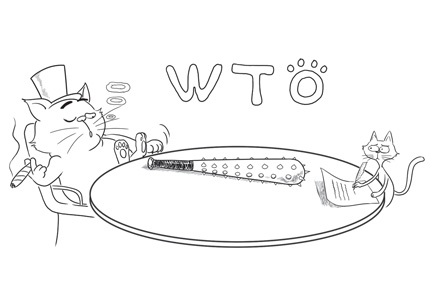Not all WTO members are equal
- By Mei Xinyu
 0 Comment(s)
0 Comment(s) Print
Print E-mail
Shanghai Daily, August 11, 2011
E-mail
Shanghai Daily, August 11, 2011
 |
|
[By Zhou Tao/Shanghai Daily] |
Chinese exporters' mood swung from low to high on July 15, when the World Trade Organization supported China's case against the European Union's anti-dumping duties on Chinese-made steel fasteners.
This unprecedented victory over the Europeans came 10 days after the WTO ruling that China's restrictions on raw materials exports were illegal. The rulings under the same WTO framework have mirrored to some extent the conflicting interests and unequal status of WTO members.
In theory, the establishment of the General Agreement on Tariffs and Trade, the WTO's precursor, is aimed at fostering global free trade, growth and citizens' well-being. Its preamble starts with the pledge that all members will be treated as equals. In fact, there is a disparity between the privileges enjoyed by old and new members.
This reality owes much to the fact that a candidate must obtain the approval of all 153 members to join the WTO, although there is an article stipulating that a two-thirds majority vote is enough for the admission of new members. This arrangement enables existing members to dictate terms on the accession of new members, which previously centered on trade but now increasingly extends to their domestic economic systems. They seek to curb the rights of new members, leading to de facto inequality in the WTO.
It took nearly 15 years for China to join the WTO in 2001, with then Premier Zhu Rongji quipping that Chinese negotiators' hair had turned white due to the prolonged membership talks. Likewise, Russia, after initiating its WTO bid 18 years ago, remains outside the WTO amid the tussle over attempted curbs on its rights.
The Articles 15, 16 and 17 in the protocol of China's entry into the WTO are typical "unequal treaties," allowing other members to not recognize its market economy status and employ Transitional Safeguard Mechanism, a punitive trade practice, against specific Made-in-China products.
China lost the raw material case precisely because Article 11 in its WTO accession protocol demands that the nation abandon all tariffs imposed on exports.
However, Article 20 in the GATT's charter spells out that it is a sovereign right to limit raw material exports to ensure supply for domestic industry. But the WTO protocol has stripped China of this prerogative.





